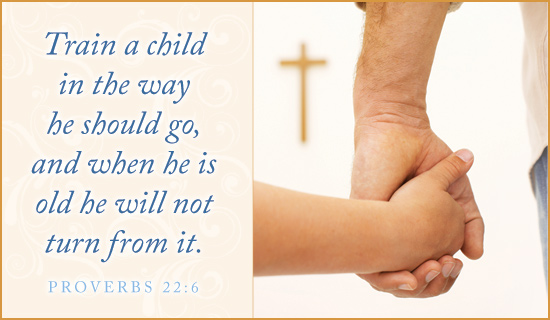Unless their children marry outside the faith, that is. In other words the Proverbial formula and the Burke quote are not absolutes and there are variables. Marrying outside the faith is a big one and it definitely works against the faith learned in the home. It was once thought that the Christian in the marriage would bring the non-religious spouse to the Church but the more recent experience is the opposite. The non-religious spouse will most likely draw the Christian away from the Church and the faith. Or so the polls tell us.
A parent’s religious identity (or lack thereof) can do a lot to shape a child’s religious habits and beliefs later in life. A 2016 Pew Research Center study found that regardless of the religion, those raised in households in which both parents shared the same religion still identified with that faith in adulthood. For instance, 84 percent of people raised by Protestant parents are still Protestant as adults. Similarly, people raised without religion are less apt to look for it as they grow older — that same Pew study found that 63 percent of people who grew up with two religiously unaffiliated parents were still nonreligious as adults.Furthermore, it is even less likely that a non-religious person will marry or cohabit with a religious one.
In the 1970s, most nonreligious Americans had a religious spouse and often, that partner would draw them back into regular religious practice. But now, a growing number of unaffiliated Americans are settling down with someone who isn’t religious — a process that may have been accelerated by the sheer number of secular romantic partners available, and the rise of online dating. Today, 74 percent of unaffiliated millennials have a nonreligious partner or spouse, while only 26 percent have a partner who is religious.And we can add to this the increasing age at which children marry. What this means in practicality is that not only is the couple more likely to live away from their parents and where they were raised in the faith but also that, deprived of this family support, the couple, religious or not, will feel even greater pull away from the faith and the Church than closer. What this means for the next generation is also significant. Without the example and presence of grandparents and extended family, it is even more likely that the pull away from the Church and out of the faith will continue without challenge and without the encouragement and example of the family that remains.
- For the many millennials who never had strong ties to religion to begin with, this means they will be even less likely to develop habits or make associations that would encourage return to religion.
- Young adults are also increasingly likely to have a spouse who is nonreligious; for young adults raised in the faith the secular worldview will be reinforced by the non-religious spouse and for those who are non-religious there will be little to challenge that secular worldview.
- Changing views about the relationship between morality and religion work against any belief that faith or religious institutions are simply relevant or necessary for their children.
- Absent the positive influence of parents, grandparents, and other extended family who are actively involved in religion, it is even more likely that their children will be raised with an exclusively secular worldview and a negative perception of religion.

No comments:
Post a Comment